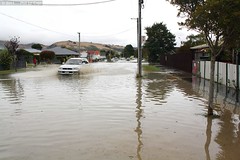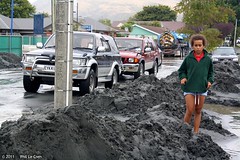
Search
Images for canterbury; more images...
Fairfax Video, October 2010 (20)
Videos, UC QuakeStudies
A video of The Exponents performing at the Band Together concert in Hagley Park. The concert was held on the 23 October 2010 for the people of Canterbury after the 2010 earthquakes.
Fairfax Video, October 2010 (13)
Videos, UC QuakeStudies
A video of Dane Rumble performing at the Band Together concert in Hagley Park. The concert was held on the 23 October 2010 for the people of Canterbury after the 2010 earthquakes.
Photograph by Jocelyn Kinghorn 2292
Images, UC QuakeStudies
Portaloos on the Pine Mound, part of Festival of Flowers. Each portaloo was decorated with various floral features. Detail of the portaloo which has been decorated in Canterbury colours, red and black.
Timaru Herald Image: Grant Shimmin 2010:09:04 09:17:55
Images, UC QuakeStudies
Photograph captioned by Fairfax, "The pinnacle of the steeple of St. Joseph's Catholic Church in Temuka was displaced by the 7.1 magnitude earthquake that struck the Canterbury region the previous day".
Timaru Herald Image: Grant Shimmin 2010:09:04 09:21:55
Images, UC QuakeStudies
Photograph captioned by Fairfax, "The pinnacle of the steeple of St. Joseph's Catholic Church in Temuka was displaced by the 7.1 magnitude earthquake that struck the Canterbury region the previous day".
Fairfax Media Auckland Bureau Image: John Selkirk 2010:10:04 21:11:37
Images, UC QuakeStudies
Photograph captioned by Fairfax, "The Canterbury Earthquake Business Benefit Dinner hosted by the Prime Minister, was held tonight at Sky City in Auckland. Shown is the Fairfax Media lot up for auction".
Fairfax Media Auckland Bureau Image: John Selkirk 2010:10:04 20:40:56
Images, UC QuakeStudies
Photograph captioned by Fairfax, "The Canterbury Earthquake Business Benefit Dinner hosted by the Prime Minister, was held tonight at Sky City in Auckland. Shown at the dinner is Telecom CEO Paul Reynolds".
Christchurch Press Image: Iain McGregor 2010:10:05 05:18:17
Images, UC QuakeStudies
Photograph captioned by Fairfax, "2010 Canterbury Earthquake. Story to do with grants for people without water and sewage. Miriam O'Malley waits to use a portaloo outside her house on Maling Street".
Christchurch Press Image: John Kirk-Anderson 2010:12:11 10:35:08
Images, UC QuakeStudies
Photograph captioned by Fairfax, "Karim Mina (17) is missed by a thrown wet sponge at an event in Victoria Square to raise funds for the Coptic Church, damaged in the Canterbury earthquake".
Fairfax Video, October 2010 (18)
Videos, UC QuakeStudies
A video of Op Shop performing at the Band Together concert in Hagley Park. The concert was held on the 23 October 2010 for the people of Canterbury after the 2010 earthquakes.
Fairfax Video, October 2010 (14)
Videos, UC QuakeStudies
A video of The Dukes performing at the Band Together concert in Hagley Park. The concert was held on the 23 October 2010 for the people of Canterbury after the 2010 earthquakes.
The Timaru Herald Image: John Kirk-Anderson 2010:12:11 10:48:08
Images, UC QuakeStudies
Photograph captioned by Fairfax, "Nader Guirguis assists Michael Awadalla with his traditional Arabic headdress at an event in Victoria Square to raise funds for the Coptic Church, damaged in the Canterbury earthquake".
The Timaru Herald Image: John Kirk-Anderson 2010:12:11 10:48:08
Images, UC QuakeStudies
Photograph captioned by Fairfax, "Nader Guirguis assists Michael Awadalla with his traditional Arabic headdress at an event in Victoria Square to raise funds for the Coptic Church, damaged in the Canterbury earthquake".
Me Korero
Audio, Radio New Zealand
The Canterbury Women's Club had their first function since the 22nd Feburary 2011 earthquake last weekend, we speak with their president Margaret Arnald as the club celebrates it's 101st anniversary.
Dealing with post-earthquake disruption - perspectives from accommodation …
Research Papers, Lincoln University
Summary report prepared for Christchurch and Canterbury Tourism which presented overall research findings with a focus on those relaing to the provision and effectiveness of visitor information after the February 2011 earthquake
Julius von Haast and his Milkcan Seismometer
Articles, Lost Christchurch
German born colonist, Sir Julius von Haast, was an explorer specialising in geology. Amongst his many achievements was the founding of the Canterbury Museum. Born Johann Franz von Haast in 1822, in…
The Government Provincial Buildings
Articles, Lost Christchurch
Christchurch has a frontier appearance about it in this photograph taken by Dr. Barker in 1860 from the tower of the Canterbury Provincial Buildings. With little beyond the immediate streets, it c…
Built with earthquakes in mind – St. Michael and All the Angels Church c.1…
Articles, Lost Christchurch
The Anglican church of St. Michael and All the Angels, at 84 Oxford Terrace, stands on the site of the first church the Canterbury Association’s settlers built in 1851. Perhaps there a…
20081011_1524_1D3-45 Deans Homestead October 2008
Images, eqnz.chch.2010
The historic Deans Homestead 23 months ago. Now destroyed in the Canterbury earthquake of September 4th 2010. This photo was taken on the PSNZ 2008 Southern Regional Photographic Convention bus trip.
Nisbet, Alastair, 1958- :'To Let - Plenty of Character'. 27 April 2012
Images, Alexander Turnbull Library
Shows an enormous Earthquake Recovery Minister Gerry Brownlee portrayed as a house for rent being viewed by a couple. Context: Brownlee announced plans to alleviate Christchurch's housing shortage by increasing rental stocks (Stuff 24 April 2012) Quantity: 1 digital cartoon(s).
Transforming Tertiary Science Education: Improving learning during lectures
Research papers, University of Canterbury Library
Science education research shows that a traditional, stand-and-deliver lecture format is less effective than teaching strategies that are learner-centred and that promote active engagement. The Carl Wieman Science Education Initiative (CWSEI) has used this research to develop resources to improve learning in university science courses. We report on a successful adaptation and implementation of CWSEI in the New Zealand university context. This two-year project at Massey University and the University of Canterbury began by using perception and concept surveys before and after undergraduate science courses to measure students’ attitudes towards science as well as their knowledge. Using these data, and classroom observations of student engagement and corroborating focus groups, the research team worked with lecturers to create interventions to enhance student engagement and learning in those courses. Results show several positive changes related to these interventions and they suggest several recommendations for lecturers and course coordinators. The recommendations include:1. Make learning outcomes clear, both for the lecturer and the students; this helps to cull extraneous material and scaffold student learning. 2. Use interactive activities to improve engagement, develop deeper levels of thinking, and improve learning. 3. Intentionally foster “expert-like thinking” amongst students in the first few semesters of the degree programme. 4. Be flexible because one size does not fit all and contextual events are beyond anyone’s control.In addition to these recommendations, data collected at the Canterbury site during the 2010 and 2011 earthquakes reinforced the understanding that the most carefully designed teaching innovations are subject to contextual conditions beyond the control of academics.
Shaken but not Stirred: A University's Resilience in the Face of Adversity…
Research papers, University of Canterbury Library
On 4 September 2010, people in Canterbury were shaken from their beds by a major earthquake. This report tells the story of the University of Canterbury (UC), its staff and its students, as they rose to the many challenges presented by the earthquake. This report however, is intended to do more than just acknowledge their hard work and determination; it also critically reflects on the things that worked well and the aspects of the response that, in hindsight, could have been done better. Luckily major events such as this earthquake do not happen every day. UC has benefited from the many universities around the world that have shared their experiences of previous disasters. We hope that this report serves to pass forward the favour and enables others to benefit from the lessons that we have learnt from this event.
Women's Voices: Solace and social innovation in the aftermath of the 2010 …
Research papers, University of Canterbury Library
The Canterbury earthquakes and the rebuild are generation-defining events for twenty-first century Aotearoa/ New Zealand. This article uses an actor network approach to explore 32 women’s narratives of being shaken into dangerous disaster situations and reconstituting themselves to cope in socially innovative ways. The women’s stories articulate on-going collective narratives of experiencing disaster and coping with loss in ‘resilient’ ways. In these women’s experiences, coping in disasters is not achieved by talking through the emotional trauma. Instead, coping comes from seeking solace through engagement with one’s own and others’ personal risk and resourcefulness in ways that feed into the emergence of socially innovative voluntary organisations. These stories offer conceptual insight into the multivalent interconnections between resilience and vulnerabilities and the contested nature of post-disaster recovery in Aotearoa/New Zealand. These women gave voice to living through disasters resiliently in ways that forged new networks of support across collective and personal narratives and broader social goals and aspirations for Aotearoa/New Zealand’s future.
UC Risk Evaluation Process for Building Occupancy
Articles, UC QuakeStudies
A document outlying the initial evaluation process for building occupancy on campus after the 22 February 2011 earthquake.
Flow Chart of the UC Strategic Emergency Management Group and UC Incident …
Articles, UC QuakeStudies
A flowchart outlining the structure and organisation of the UC Strategic Emergency Management Group and UC Incident Management Team.
Christchurch Press Image: Ben Heather 2010:09:05 23:42:21
Images, UC QuakeStudies
Photograph captioned by Fairfax, "Canterbury Cheesemonger owner Martin Aspinwall is afraid that with other buildings in his block set for the wrecking ball, his business will be driven out and forced to close".
Christchurch Press Image: Ben Heather 2010:09:05 23:41:43
Images, UC QuakeStudies
Photograph captioned by Fairfax, "Canterbury Cheesemonger owner Martin Aspinwall is afraid that with other buildings in his block set for the wrecking ball, his business will be driven out and forced to close".
Christchurch Press Image: John Kirk-Anderson 2010:12:11 10:35:03
Images, UC QuakeStudies
Photograph captioned by Fairfax, "Karim Mina (17) is narrowly missed by a thrown wet sponge at an event in Victoria Square to raise funds for the Coptic Church, damaged in the Canterbury earthquake".
Engaging Quake Claimants and Community Networks - Address by Keith Land
Videos, UC QuakeStudies
A video of an address by Keith Land, Head of Canterbury Land Settlement, EQC, at the 2015 Seismics and the City forum. This talk is about learning from complex claims and local knowledge.
Central Leader Image: Jason Oxenham 2010:09:23 10:27:48
Images, UC QuakeStudies
Photograph captioned by Fairfax, "Halsey Drive School has organised a red and black day which raised close to $1000 for the Canterbury earthquake relief. From left: Laura Young, Dalton Hiley and Kitty Sun".



